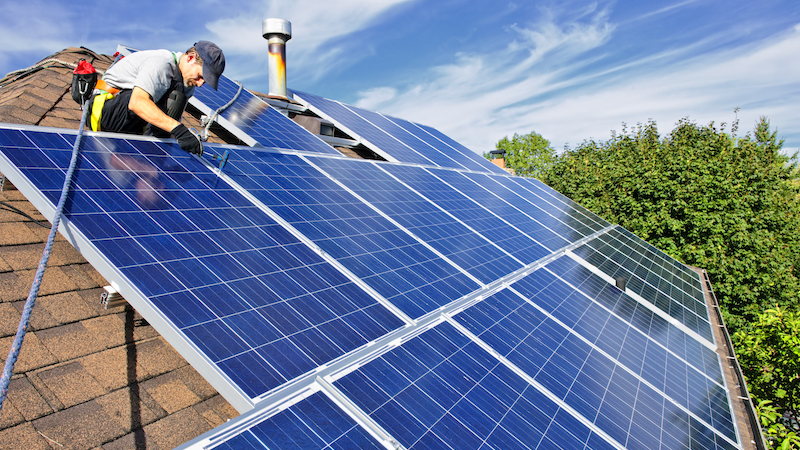Donald Trump’s decision to place punitive tariffs on imported solar panels has drawn ire from the UN’s renewable energy chief.
On the opening morning of the World Economic Forum in Davos, Rachel Kyte said: “Putting these kinds of tariffs on renewable energy is going to cause some kind of domestic disruption; how much, we don’t know.”
On Monday, the US president placed a 30% tariff on imported solar panels, after two local manufacturers complained to the US trade regulator that cheap Chinese products were swamping their business. The tax will decline over four years to 15% and 2.5GW of cells will be allowed to enter the country tariff-free.
The US Solar Energy Industries Association said on Monday Trump’s decision would lead to the loss of 23,000 jobs this year as higher prices for panels would crush demand for rooftop solar.
“It boggles my mind that this president – any president, really – would voluntarily choose to damage one of the fastest-growing segments of our economy,” said Tony Clifford, the chief development officer of Standard Solar.
India: Solar sector wary of China as protectionist policy nears an end
Independent estimates have been more sanguine. Goldman Sachs said the price of solar would rise 3-7%. MJ Shiao, the renewable energy lead at Wood Mackenzie said the tariffs would likely cut installation projections by 10-15% over the next five years.
”It is a significant impact, but certainly not destructive to the end market,” Shiao told Reuters.
Kyte said she felt the move would not stop the solar industry in the US.
“I don’t think that this is more than a blip. You’re not going to turn back the wave of renewable technology with these kind of trade interventions,” she said.
However, she noted that the problem of cheap solar products from China hampering domestic industry was real, and not restricted to the US. In India, tumbling solar prices driven by China have crushed local manufacturers.
“One of the things we have not done yet is internalise the struggle to combat climate change into the trade regime,” said Kyte. “And so we have competing interests around domestic content for – in this case – solar PV panels… [and] an imperative to drive decarbonisation as quickly as possible.”
India was recently forced by the World Trade Organisation (WTO) to drop protectionist measures against Chinese solar panels.
Indian energy minister Piyush Goyal, who was also on the panel in Davos, would not be drawn to comment on Trump’s move to protect local industries, saying only: “India has chosen to go down the path of clean energy… and that path is irreversible as far as India is concerned. Irrespective of what other countries may do.”
China has already raised the prospect of a WTO appeal against the Trump tariffs.
Chief executive of Brazilian state oil company Petrobras Pedro Pullen Parente, who was also on the panel, said the policy would hamper the shift away from coal in the US.
“It’s something that concerns because probably you will again see coal increasing and probably the numbers will be even worse,” he said. Trump campaigned on a platform of reinvigorating the coal industry, but that fuel does more to drive climate change than any other.
